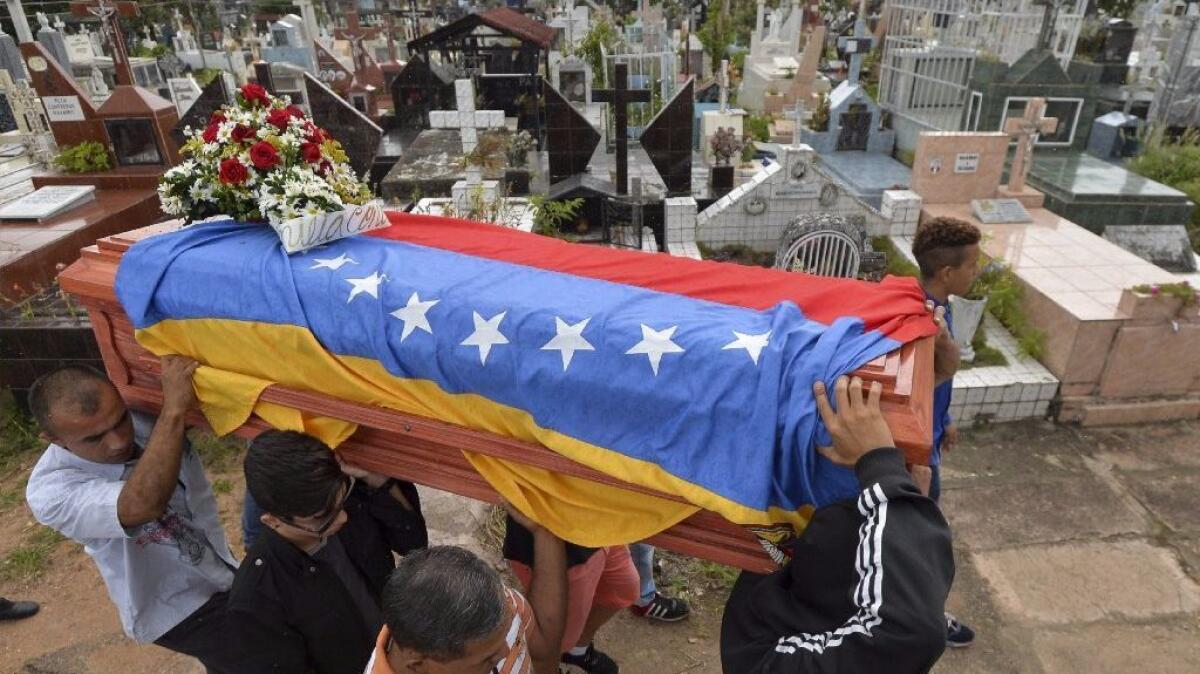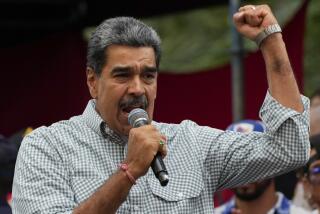Venezuela Supreme Court decries new U.S. sanctions

- Share via
Reporting from Caracas — Venezuelan justices Friday railed against the latest attempt of the Trump administration to tighten the screws on the leftist government of President Nicolas Maduro as the country lurches under extreme poverty, economic collapse and explosive violence.
The U.S. imposed new economic sanctions on eight members of the Venezuelan Supreme Court, including its president, Maikel Jose Moreno Perez.
They were accused of using their power to usurp the authority of Venezuela’s “democratically elected legislature,” which stands in opposition to Maduro and has been largely sidelined by him, the Treasury Department said. Maduro also controls the court, which has routinely backed his increasingly autocratic actions.
It is the first time the U.S. has sanctioned an entire panel of judges. Earlier this year, the administration also blacklisted Venezuela’s vice president, Tareck El Aissami, accusing him of being a major drug trafficker.
The sanctions mean that any assets that those people named have in the United States are frozen, and U.S. businesses and individuals may not do business with them.
President Trump, on Thursday during a visit by Colombia President Juan Manuel Santos, said the situation in Venezuela, with severe food shortages and deadly crackdowns by security forces on civilian protesters, was “a disgrace to humanity.”
Maduro’s supporters counter-accused Washington of bullying and violating international law.
“We do not accept the imposition and intervention of any foreign government in our court’s activities,” Moreno Perez, the tribunal president, said. “The government of the United States is attempting to co-opt and intimidate the conscience of the magistrates of Venezuela’s maximum judicial body,” he added.
Venezuelan Foreign Minister Delcy Rodriguez denounced “imperial aggression.”
“The U.S. power system does not miss an opportunity to violate international law,” she said.
The Treasury Department said the eight judges named — out of a total of 32 on the full court — were responsible for some of the more abusive recent legal decisions in Venezuela, including stripping National Assembly members of immunity, voiding laws passed by the assembly and taking on legislative functions.
The chief justice, Moreno Perez, has a particularly colorful history, according to Venezuelan news reports. He served time for murder 30 years ago and was implicated in at least two other murders yet continued to rise in Venezuela’s murky security services. He became a judge under the government of Socialist strongman Hugo Chavez, who tapped Maduro to take over upon his death in 2013. In 2014, he married his second wife who became a Miss Venezuela beauty queen.
Republican Sen. Marco Rubio, whose state of Florida is home to thousands of wealthy Venezuelans who have fled their country, praised the new sanctions.
“I am pleased that the administration has made Venezuela, human rights and respect for democracy a priority,” Rubio said. “Along with the help of United Nations Ambassador Nikki Haley, we’ve made it clear to Maduro and his thugs that their actions are not going to go unpunished.”
The Trump administration has shown little interest in human rights and humanitarian cases in its evolving global foreign policy. Venezuela, an oil-rich country of 31 million people, has caught Trump’s eye in part because it remains a staunch ally of Communist Cuba and has been portrayed in some circles as a gateway to the continent for Iran. Iranian officials have made numerous visits to Venezuela over the years and are believed to have made inroads. U.S. authorities also believe some Venezuelan officials are complicit in the the country having become a major cocaine trafficking corridor.
Because of the fall in oil prices, Maduro’s government’s mismanagement and widespread corruption, Venezuela has fallen into abysmal crisis. In addition to shortages of food, medicine and other basic commodities are scarce; inflation is one of the highest in the world, as is the homicide rate, and state security forces have taken to opening fire on increasingly vociferous street protests by civilians, claiming dozens of lives.
Staff writer Wilkinson reported from Washington and special correspondent Mogollon from Caracas
For more on international affairs, follow @TracyKWilkinson on Twitter
ALSO
Trump’s Russia troubles worsen even as he heads overseas
Why Gulf Arab leaders are welcoming Trump’s transactional foreign policy
Trump’s erratic style and thirst for a deal has some Israeli officials unnerved
More to Read
Sign up for Essential California
The most important California stories and recommendations in your inbox every morning.
You may occasionally receive promotional content from the Los Angeles Times.











